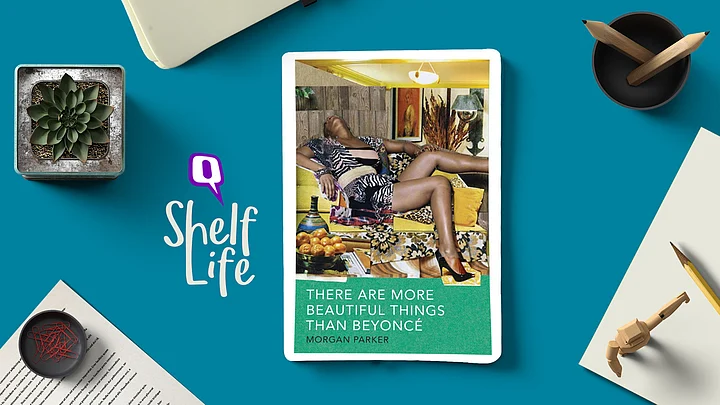Have you ever read a book so raw, that you claim to not understand it in its entirety, instead of coming to terms with how deep the diamond words cut into your soul? That’s There Are Better Things Than Beyoncé by Morgan Parker for you.
A fierce and risqué collection of poems on what it means to be an African American woman in contemporary America, the book uses pop culture references to explore the topics of possession and self-ownership, sex, commodification, economies of desire, religion, feminism, modern media, politics, and of course, the experiences of black womanhood.
All this, she does in a very genuine, bear-all way, keeping in mind how complex it is to be a human being:
Beyond Queen Bey
The book doesn’t so much begin, as it explodes. We immediately feel Parker’s frustration at feeling invisible in the first poem, “All They Want Is My Money My Pussy My Blood.” If you’re thrown off by the title, Parker has succeeded.
Throughout the book, she switches between styles from funny to profound to skewering, but almost each poem has at least one line that will leave you with your jaw clenched, feeling empowered and restless at the same time.
In the poem, she nonchalantly remarks, “At school, they learned that black people happened” speaking about a group of kids. It’s a small line, but once the last word leaves your mouth, you’re left with just one thought: why are we always taught about black identity as a thing that happened in the past?
The collection isn't about Beyoncé per se, but rather the socio-cultural expectations her fans have of her as the flawless Queen Bey.
At her book launch, Parker explained by asking “What do we actually know about Beyoncé, aside from her music?” Not much. In Parker’s poems, Beyoncé is constantly misunderstood, unable to meet the unfair expectations of the public. “The President’s Wife” begins, “Sometimes I wonder / Is Beyoncé who she says she is.” In the book’s shortest poem, “What Beyoncé Won’t Say on a Shrink’s Couch,” she says:
The title of the book is literal: Parker believes that Beyoncé is not the only example of black womanhood. Various powerful women appear in the poems: multiple Beyoncés, Michelle Obama, Queen Latifah and even Lady Gaga as tropes or mouthpieces for Parker to convey that “We’re everyone. We have ideas and vaginas, history and clothes and a mother.”
Also read: Shelf Life: Umberto Eco’s Novel Echoes Today’s World of Fake News
A Review
Honestly, the book was a little hard for me to read. One, because she intentionally makes it hard, twisting and bending prose into uneasy poetry with surreal spacing and her off-handish style. Then, as a brown woman not very clued into American or Black American culture, a lot of the references to songs, people and moments missed me.
But I understood what she was trying to tell me, really. That understanding combined with the hard-hitting lines I encountered periodically (like "art is nice but the question is how are you/ making money are you for sale"), was enough to send me to Google happily searching up who Fred Hampton was in:
Rolling racial politics seamlessly into pop culture, here she is referring to 4 December 1969, when Hampton, a leader in the Black Panther Party, was murdered in his bed by Chicago police, as part of the FBI’s effort to kill the Black liberation movement.
When I was done, I just couldn’t shake off a few poems.
Keepsakes
There’s “99 Problems”, where Parker simply lists down her problems as a black woman in America. Points 16-19 say “oppression” repeatedly while points 94-96 run into a disjointed sentence:
In a sardonic, funny “Afro”, Parker lists out once again “weapons” she is hiding in her big hair often made fun of: “buttermilk pancake cardboard... 40 yards of cheap wax prints... blueprints for building ergonomically perfect dancers & athletes.”
In “Heaven be a Xanax”, Morgan straight out prays for heaven to be better for women than Earth:
“When I get to heaven
I’m going to wear my good bra [...]
And I will kneel to pray
And I will address the prayer to myself
And I will be allowed.”
But it was the one line here and the two lines there that kept me up the night I read this book. Parker knows how to go for the jugular.
Parker made me want to scream and cry; she left me angry and laughing. The more I read it– and you have to re-read her poems– the more I was moved. It’s not a book you pick up, read and move-on. You have to allow yourself to be hurt by her words, and then as you turn the page, healed.
(We all love to express ourselves, but how often do we do it in our mother tongue? Here's your chance! This Independence Day, khul ke bol with BOL – Love your Bhasha. Sing, write, perform, spew poetry – whatever you like – in your mother tongue. Send us your BOL atbol@thequint.com or WhatsApp it to 9910181818.)
(At The Quint, we question everything. Play an active role in shaping our journalism by becoming a member today.)
